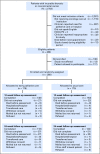Role of Patient Coping Strategies in Understanding the Effects of Early Palliative Care on Quality of Life and Mood
- PMID: 29140772
- PMCID: PMC5756320
- DOI: 10.1200/JCO.2017.73.7221
Role of Patient Coping Strategies in Understanding the Effects of Early Palliative Care on Quality of Life and Mood
Abstract
Purpose The early integration of oncology and palliative care (EIPC) improves quality of life (QOL) and mood for patients with advanced cancer. However, the mechanisms by which EIPC benefits these outcomes remain unclear. We therefore examined whether EIPC improved patients' coping strategies and if changes in coping accounted for intervention effects on QOL and depressive symptoms. Patients and Methods For this secondary analysis of an EIPC trial, we examined data from 350 patients with newly diagnosed incurable lung or GI cancer. Participants completed assessments of QOL (Functional Assessment of Cancer Therapy-General), depressive symptoms (Patient Health Questionnaire-9), and coping (Brief COPE) at baseline and 24 weeks. We used linear regression to test intervention effects on use of coping strategies and mediation regression models with bias-corrected bootstrapping to examine whether improvements in coping mediated the effects of early palliative care on patient-reported outcomes. Results Compared with usual oncology care, EIPC significantly increased patient use of approach-oriented coping strategies ( B = 1.09; SE = 0.44; P = .01) and slightly reduced use of avoidant strategies ( B = -0.44; SE = 0.23; P = .06) from baseline to 24 weeks. Also, the increased use of approach-oriented coping and reduction in avoidant coping were associated with higher QOL and lower depressive symptoms at 24 weeks. The positive changes in approach-oriented coping, but not avoidant coping, significantly mediated the effects of EIPC on QOL (indirect effect, 1.27; 95% CI, 0.33 to 2.86) and depressive symptoms (indirect effect, -0.39; 95% CI, -0.87 to -0.08). Conclusion Patients with incurable cancer who received EIPC showed increased use of approach-oriented coping, which was associated with higher QOL and reduced depressive symptoms. Palliative care may improve these outcomes by providing patients with the skills to cope effectively with life-threatening illness.
Trial registration: ClinicalTrials.gov NCT01401907.
Figures



References
-
- Teunissen SC, Wesker W, Kruitwagen C, et al. : Symptom prevalence in patients with incurable cancer: A systematic review. J Pain Symptom Manage 34:94-104, 2007 - PubMed
-
- Delgado-Guay M, Parsons HA, Li Z, et al. : Symptom distress in advanced cancer patients with anxiety and depression in the palliative care setting. Support Care Cancer 17:573-579, 2009 - PubMed
-
- De Faye BJ, Wilson KG, Chater S, et al. : Stress and coping with advanced cancer. Palliat Support Care 4:239-249, 2006 - PubMed
-
- Wilson KG, Chochinov HM, Skirko MG, et al. : Depression and anxiety disorders in palliative cancer care. J Pain Symptom Manage 33:118-129, 2007 - PubMed
Publication types
MeSH terms
Associated data
Grants and funding
LinkOut - more resources
Full Text Sources
Other Literature Sources
Medical

